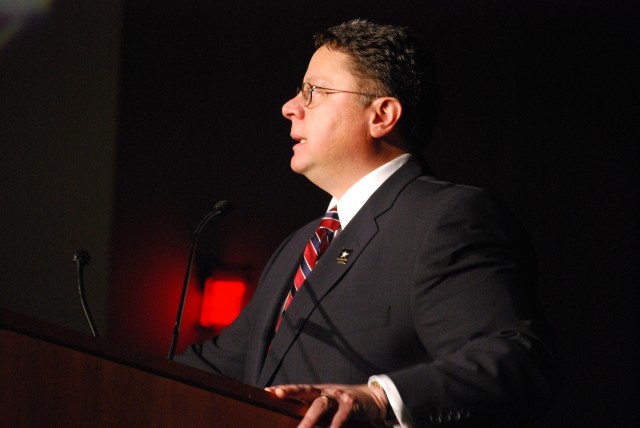
Dr. Gerardo Melendez, director of the U.S. Army Communications-Electronics Research, Development and Engineering Center's Command and Control Directorate, urged an audience of Hispanic engineers to join in solving the nation's challenges through the diversity of their experiences in a keynote speech delivered at the Society of Hispanic Professional Engineers Conference held in Washington, D.C., Oct. 29.
Melendez, who left San Juan, Puerto Rico in 1976 to attend Tulane University in New Orleans, La., spoke about his journey from San Juan to a director at CERDEC, the responsibility young Hispanics must shoulder to contribute to future generations, and the opportunities available to them at technology-focused government organizations.
Melendez, who came to New Jersey to work as an Army researcher after earning his Masters degree from Brown University, described the advantages of working for the Army, and the qualities one adopts when working for an organization whose "ultimate customer is the American Soldier."
"The primary reason why I came to work for the Army as a civilian was because they offered the best educational opportunities of any of the other employers I was considering," Melendez said. He took advantage of those opportunities by completing his Ph.D. at Drexel University.
"At the time I didn't realize the extent to which civilian Army scientists and engineers were involved in supporting our nation's Army, and wasn't aware of the creativity and innovation at work behind the scenes, and even on the front lines, to give our Soldiers the edge," he added.
Melendez, whose job is to "shape and push the state of the art in technologies...to make Soldiers more effective," described the exciting, new technologies that incoming Army scientists and researchers will have a chance to work with.
"From systems that neutralize deadly improvised explosive devices in the present conflict to the futuristic capabilities that will transform the army," Melendez said listing off examples such as ground and air robots, iPhone-like applications for the battlefield, and mash-ups of information using Google Earth.
Melendez said that educating young Hispanic engineers about Army opportunities is important because it will infuse talent and new ideas to science and technology centers.
"I'm a strong believer in diversity of opinion, diversity of experience, and diversity of education," Melendez continued, "The way we work problems now, having diversity of any type becomes more important because at the end of the day the strength of what we develop, it's only as strong as all of the ideas we can pick from, and so if we stay tuned to only one idea, then you probably get more of the same, and that's just not what we want."
Melendez believes the thousands of Hispanic engineers that attended the SHPE conference are evidence of interest in government opportunities within the Hispanic community.
"Four thousand people participated [in the conference], all engineers and Hispanic, and they are continuing to grow and those are all the right trends that we want to see not only within the Hispanic community, but in the U.S. in general."
Melendez pushed the crowd to continue what their Hispanic elders have started. "Hispanic Americans have had a very positive impact on American society, but it cannot end there. We have a responsibility to the future generations to come and to this great Nation. We must continue to accomplish in small and large scale, and continue to build even higher arches for a stronger Nation and a better world."

Social Sharing